English oral日常英语口语
ORALENGLISH英语口语复习资料.docx

1.How do you view those people who strive to seek fame? What influence may fame have on a person's life? AA: Did you watch Voice of China last night? I think the singers are just tried to seek fame.B: Why do you think so?A: Look, fancy clothes, touching story. They are spurred by impure motives such as the desire for worshipping fans and praise from peers.B: Well so how do you view those people who strive to seek fame?A: A person who seeks fame is like a dog chasing his own tail When he captures it, he does not know what else to do but to continue chasing itB: Do you mean that the lure of drowning in fame's imperial gbry is not easily resisted?A: Exactly, and the cruelty of success is that it often leads those who seek such success to participate in their own destruction.B: well you mean fame will likely contaminate a man's soul, aren't you? It's of significant for a man to remains true to himself.A: Yes. But seldom people can remain true. For example, the famous Irish writer Oscar Wilde, paid heavily for remaining true to himself both social and sexual to which the public objected.B: On the other hand, those who gain fame most often gain it as a result of expbiting their talent for singing, dancing, painting, or writing, etc.A: Yes, but there is little deny that it is those who fail that reap the greatest reward: freedom! They can express themselves in unique and original ways without fear of losing the support of fans.B: Unfortunately for most people, however; failure is the end of their struggle, not the beginning.A: That's true. Thomas Edison was thrown out of school in the fourth grade, because he seemed to his teacher to be qu让e dulL But he remains true to himself;and consist to work.B: So what do you think we should do instead of trying so hard to achieve success?A: Try to be happy w让h who you are and what you do. Try to do some works that you can be proud of.B: I agree w让h this point. Maybe you won f t be famous in your own lifetime, but you will be better than before at least.2.What do you think of young people's craze for their idols? AA: You know what, Susan took 3 part time jobs in order to attend Bingbang's concert! And she is on diet to save the money for a shirt which showed up at their ins. That's crazy!B: Come on, idolatry is quite common among the youth nowadays. Generally speaking, young people are inclined to adore the people who excel in appearance;intelligence or talent.A: But if we simply worship the idols by go to their concerts or pursuing fashions unreasonably, the idolatry is certainly a waste of money time and energy.B: Actually, I wonder what the significance of keep shouting out at the concert until their throats go hoarse. Why not make full use of time to create a promising future?A: Yes, What's more, idolatry leads young people to mix the reality with the fancy. You see, the attractive appearances and unusual styles of stars tell nothing about the harsh reality but leave them dreaming of getting something for nothing.B: Yes, idolatry affects both the world and worth values of teenagers. But we will lead a positive life if we endeavor to improve ourselves by bridging the gap between our models and us.A: Howevei; the young people are far from mature to identify what are the truth, the goodness, and the beauty. They will tend to consider their idols as perfect models.B: Exactly. Even the negative aspects of their icons can be beautified, for example, young fans may think their icons' sexy or violent behaviors is cooLA: Well so we should seize our invaluable youth and protect ourselves from blind idolatry.3.What should an effective welfare system be like? AA: I saw the news that because of all kinds of unfair things in the society there is a wide gap between the rich and the poor; and many people live in a great trouble.B: Yes, sometimes I wonder whether we have a welfare system or not.A: Of course we have, but it maybe not that effective.B: So in your opinion what should an effective welfare system be like?A: I think that an effective welfare system should be fair; complete and can brings kindness to the people who really need it.B: Yes, and the government should establish some reasonable policies that can make sure the people who need help really get the assistance payments and can live a happy life.A: And people who needs assistance should be free to develop their talents without guilt or fear一just hold a good, steady job. Besides, some special equipment which can bring some convenient should installs in the public area.B: And the caseworkers should be honest and rich of sympathy, so those policies can work effective. A good system should encourage people to live a better life, not seek evidence all the time to convict them of cheating.A: Well on the other hand, a welfare client is supposed to be honest, they shouldn't tell the caseworker that the landlord raised the rent by a hundred dollars or something like that.B: Yes, exactly. So an effective welfare system need the joint efforts of the whole society.4.Is it justifiable for devetoping countries to invest large sums of money in telecommunication networks? AA: Did you hear that? The latest news said by installing optical fibei; digital switches, and the latest wireless transmission systems, a parade of urban centers and industrial zones from Beijing to Budapest are stepping directly into the Information Age.B: Wow, Places that until recently were deaf and dumb are rapidly acquiring up-to・date telecommunications.A: Yes, that will let them promote both internal and foreign investment. Transformation is occurring that should greatly boost living standards in the devetoping worldB: I wonder how does it work?A: Widespread access to information technologies, for example, promises to condense the time required to change from labor-intensive assembly work to industries that involve engineering, marketing, and design.B: Like Telecommunications is a key to Shanghai1s dream of becoming a top financial center; is that right?A: Exactly.B: But It may take a decade for many countries in Asia, Latin America, and Eastern Europe to improve telecommunication networks.A: Well How fast these nations should push ahead is a matter of debate. Many experts think Vietnam is going too far by requiring that all mobile phones be expensive digital models.B: These countries lack experience in weighing costs and choosing between technologies. For countries that have lagged behind for so long, the temptation to move ahead in one jump is hard to resist.A: Yes, so it is justifiable for developing countries to invest large sums of money in telecommunication networks.B: Exactly. Just like the old saying goes," No pay no return0.5.How do you understand "I never found the companion that was so companionable as solitude"? BA: I saw a beautiful sentence in Wechat.B: What is it?A: T never found the companion that was so companionable as solitude/5 Do you familiar with it?B: Yes, of course. It was told by Thoreau, the author of Walden. Did you ever readthis book?A: Nope, would you mind tell me something about this book?B: Of course not. This book emphasizes the importance of self-reliance, solitude;and closeness to nature.A: So, how do you think? Do you think being solitude can make ones comfortable?B: Well, it's hard to say. For example, a king is alone, and it is always necessary for the king to be alone. He doesn't need to accept any person's identity, or anyone's mercy. The real solitude is noble.A: Yes, I'm quiet agree with you. A solitary man, no matter what kind of environment he is in, he can make himself quiet, he is always able to enjoy himself. We, as human beings, need time to be alone.B: Actually, the cond让ion of loneliness rises and falls; but the need to talk goes on forever. Its more basic than needing to listen. We still need friends we can tell important things to, people we can call to say the daily succession of small complaints.A: Exactly. People deal w让h each other every day. This interaction is at the heart of social life. Its important to be solitude and settle down and make ourselves comfortable. But more importantly; stay rationaLB: I'm totally agree w让h you.6.Do you think theme parks like Disneyland will be a cultural invasion to the local culture? AA: Hey! You know what? I've heard that Shanghai has conditions to build an excellent Disneyland and all preparations are well under way.B: Yes, I r ve heard about that, the news has sparked a heated debate on the Internet. Although some people are exc让ed about what a Disneyland might bring to the city; many expressed their disagreement and worries.A: Yeah, many people view the proposed park as a "'cultural invasion/ They are worried that American cultural and entertainment concepts carried by Disneyland might strike a blow to Chinese culture. Do you think theme parks like Disneyland will be a cultural invasion to the focal culture?B: Well people welcoming the Disneyland challenge that transnational and trans-regional cultural communication is an irreversible trend and the Chinese should welcome the introduction of various foreign cultures.A: The unrestricted introduction of foreign culture might threaten the cultural security of China. No matter how globalization evolves, it is not good to have a world full of Disneyland parks and Hollywood movies.B: As the global brand of a resort theme park, a Disneyland represents happiness and attracts tourists of all ages and from all kind of country. What's wrong w让h building a resort place like this? Besides;Shanghai is well justified in opening another window to show off its image as well as China's commitment to opening up.A: Well that's all right. But while we should regulate foreign investment in the entertainment industry according to law, we must adopt an open mind in developing our entertainment industry trying to absorb good elements of other cultures and mix them into an advanced culture with Chinese characteristics.B: If so, we can create more signature images that are popular; appealing, long-lasting and rich with Chinese cultural characteristics to satisfy people's mental demands.A: Exactly.7・ How do you understand "without the software of emotional maturity and self-knowledge, the hardware of academic training alone is worth less and less"? BA: Did you see the movie called Forrest Gump? I was deep-touched by the hero.B: It is a story about a man who become successful w让h low IQ isn f t it?A: That's right. His experiences proved that people with tow intelligence can be successful, as long as he has a high EQ. I heard a very interesting sentence "without the software of emotional maturity and self-knowledge, the hardware of academic training alone is worth less and less." So, how do you understand it?B: I think it means that the academic training is useless without cultivating emotional intelligent. However; at one point in time, IQ was viewed as the primarydeterminant of success.A: But some critics began to realize that high intelligence is not the only reason for success. Although being smart is very important, but more important is how to well use the intelligence you have. No matter how broad, knowledge is useless until it is applied And application takes high EQ.B: Ho we ven IQ is still recognized as an important element of success, particularly when it comes to academic achievement. People with high IQs typically to do well in school often earn more money, and tend to be healthier in generaL So, I think having a high IQ is really important.A: You're right. But today experts recognize it is not the only determinate of life success. Instead, it is part of a complex array of influences that includes emotional intelligence among other things.B: You mean, one's character determines one's destiny, which stresses on the importance of EQ. And a high EQ will make a person become more optimistic, confident and passionate in his work. Is that right?A: Yes, research has found that individuals w让h strong leadership potential also tend to be more emotionally intelligent, suggesting that a high EQ is an important quality for business leaders and managers to have.B: Therefore, while EQ indeed can't be ignored, IQ is also vital for one to be successfulA: That's right.。
Oral english 100 (英语口语100句)

1.How are you doing?(你好吗?)2.I'm doing great.(我过得很好。
)3.What's up?(出什么事了你在忙些什么怎么了?)4.Nothing special.(没什么特别的。
)5.Hi. Long time no see.(嗨,好久不见了。
)6.So far so good.(到目前为止,一切都好。
)7.Things couldn't be better.(一切顺利。
)8.How about yourself?(你自己呢?)9.Today is a great day.(今天是个好日子。
)10.Are you making progress?(有进展吗?)11.May I have your name, please? (请问尊姓大名?)12.I've heard so much about you.(久仰大名。
)13.I hope you're enjoying your staying here.(希望你在这里过得愉快。
)14.Let"s get together again.(改天再聚聚。
)15.That's a great idea!(好主意!)16.Please say hello to your mother for me.(请代我向你母亲问好。
_)17.I'm glad to have met you.(很高兴遇到你。
)18.Don't forget us.(别忘了我们。
)19.Keep in touch.(保持联系。
)20.I had a wonderful time here.(我在这里度过了难忘的时光。
)21.Have a nice weekend.(周末愉快。
)22.Same to you.(彼此彼此。
)23.Nice talking to you.(很高兴与你聊天。
Oral English日常常用英语口语

Oral English日常常用英语口语2Speak up!Dare to open your mouth!3Chapter 1Basic Communication基本交流4Section 1 Greeting见面问候5见面打招呼● 1. Hello! / Hi! 你好!● 2. Good morning / afternoon / evening! 早晨(下午/晚上)好!●Have you eaten yet?●Where are you going/from?Chinese6好久不见!●Long time no see.●I haven’t seen you for a long time. ●………………………….. for ages.●………………………….. for a century. ●………………………….. for centuries.●Yeah, it’s been so long.●…………too long.7问候●How are you?●How are you doing?●How’s everything going?●How are things?●What’s up?回应●Good/Great!●Very well!●It’s going pretty well.●Not bad.●Just so-so.●Same as always/usual.●Terrible.9S p e a k i n g10多聊几句?●聊气色●You look fine/pale.●You’re in the pink.●You’re looking bouncy.●聊天气●It’s a nice day, isn’t it?● A lovely day, isn’t it?●It’s really cold today.●bouncy●adj. 有弹性的;快活的;精神饱满的;自大的●looking bouncy●看起来生龙活虎,精力充沛11Section 2 Weather天气12Weather Forecast 天气预报●Sun --- sunny storm ---sandstorm ●Cloud --- cloudy --- thunderstorm●Rain ---rainy clear up (天)放晴●Snow --- snowy●Wind --- windy●Fog ---foggy●Haze ---hazy好天气好心情●Nice●Good●Great●Lovely●pleasant●Beautiful●Wonderful14恶劣天气影响心情●Bad●Nasty●Rough●Awful●Terrible●Dreadful15Temperature 温度●Warm (spring)●Hot (summer)●Cool (autumn/fall)●Cold (winter)16怎一个冷字了得●cold 最普通用词,强调缺乏温暖,使人不舒服。
英语口语展示2分钟

英语口语展示2分钟Sure! Here's a sample 2-minute English oral presentation: Good morning/afternoon everyone,Today, I would like to talk about the importance of learning a second language. In our increasingly globalized world, being able to communicate in more than one language has become a valuable skill. Let me share with you a few reasons why learning a second language is beneficial.Firstly, learning a second language opens doors to new opportunities. It enhances your career prospects by increasing your marketability and making you stand out in a competitive job market. Many companies now operate globally, and being able to speak a second language can give you an advantage, as you can communicate effectively with international clients and colleagues.Secondly, learning a second language broadens your horizons. It gives you insight into different cultures, traditions, and perspectives, allowing you to gain a deeper understanding and appreciation of diversity. Language is not only a means of communication; it is also a gateway to exploring newexperiences and making meaningful connections with people from around the world.Additionally, learning a second language improves cognitive abilities. Studies have shown that bilingual individuals have better problem-solving skills, enhanced memory, and increased creativity. It exercises your brain and keeps it sharp, which can help delay cognitive decline associated with aging. Moreover, learning a second language boosts confidence and self-esteem. It takes courage to step out of your comfort zone and communicate in a new language. As you overcome language barriers and achieve proficiency, you gain confidence in your abilities, which can positively impact other areas of your life as well.In conclusion, learning a second language has numerous benefits. It opens up opportunities, broadens your horizons, enhances cognitive abilities, and boosts confidence. So, I encourage all of you to embrace the challenge of learning a new language. It is a lifelong journey filled with rewarding experiences and personal growth.Thank you for your attention.。
4岁孩子日常英语口语

4岁孩子日常英语口语English Response:Introduction:Engaging your 4-year-old in regular English conversations is crucial for their language development and communication skills. Here are some ideas for daily English oral practice:Morning Rituals:Good morning, sunshine!Did you sleep well, little one?Let's get dressed and brush our teeth.It's time for breakfast! What would you like to eat?Playtime and Activities:Let's play hide-and-seek!Can you count the blocks from 1 to 10? Let's sing a song together.What color is this toy?Mealtimes:What's for lunch today?Do you want some soup or sandwich?Please pass the salt, honey.Let's say grace before we eat.Outdoor Adventures:Let's go for a walk in the park.Look at the birds flying in the sky.Can you find a red flower?Let's play on the swings.Bedtime Routine:Time for a bath!Let's read a bedtime story.What was your favorite part of the day? Sweet dreams, my little star.Additional Tips:Use simple and clear language.Repeat words and phrases often.Ask open-ended questions to encourage conversation.Provide opportunities for your child to express themselves.Make it fun and engaging.Remember: Language learning is a journey, not a race. Be patient, consistent, and make it a joyful experience for your child.Chinese Response:引言:让4岁的孩子参与日常英语口语交流对他们的语言发展和沟通能力至关重要。
ket英语口语话题范文
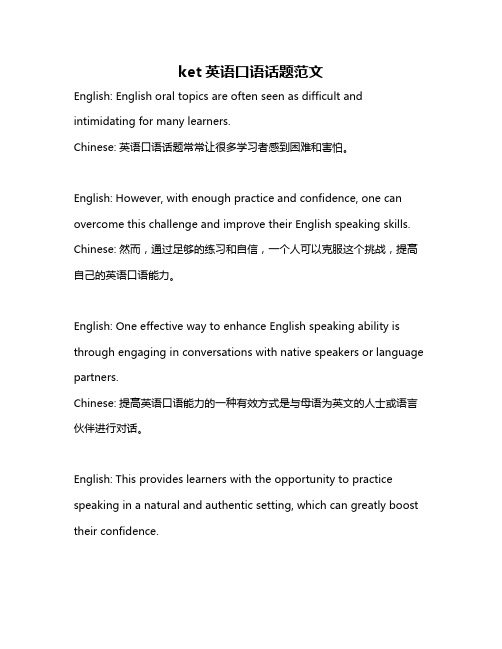
ket英语口语话题范文English: English oral topics are often seen as difficult and intimidating for many learners.Chinese: 英语口语话题常常让很多学习者感到困难和害怕。
English: However, with enough practice and confidence, one can overcome this challenge and improve their English speaking skills. Chinese: 然而,通过足够的练习和自信,一个人可以克服这个挑战,提高自己的英语口语能力。
English: One effective way to enhance English speaking ability is through engaging in conversations with native speakers or language partners.Chinese: 提高英语口语能力的一种有效方式是与母语为英文的人士或语言伙伴进行对话。
English: This provides learners with the opportunity to practice speaking in a natural and authentic setting, which can greatly boost their confidence.Chinese: 这为学习者提供了在自然真实环境中练习口语的机会,可以极大地增强他们的自信心。
English: Additionally, watching English TV shows or listening to English radio programs can also help improve one's pronunciation and listening skills.Chinese: 此外,观看英文电视节目或收听英文广播节目也可以帮助提高一个人的发音和听力技能。
Oral English 英语口语天天练

Oral English英语口语天天练The first week1. Please do me a favor. 请帮我一个忙。
2. You can eat whatever you like. 你随便吃。
3. We should do our best to help her. 我们应该尽力帮助它。
4. How nice to see you! 见到你真高兴!5. Be kind to animals. 要爱护动物。
6. Don't worry. Everything will be all right. 别着急,一切都会好的。
7. Use your brain. 动动脑筋。
8. Let's have a break. 我们休息一下吧。
9. We should be polite to everyone. 我们应该礼貌待人。
10. Don't be rude to your parents. 对父母要有礼貌。
The second week1. What time is it? It's seven thirty. 几点了?七点半。
2. What day is it today? Today is Tuesday. 今天星期几?星期二。
3. What's the date today? It's March 6. 今天几号?三月六日。
4. When do you go to bed? At nine o'clock. 你什么时候睡觉?九点。
5. I usually get up at six thirty in the morning. 我通常六点半起床。
6. He has breakfast at seven. 他七点吃早饭。
7. Excuse me. 请原谅。
(用于打扰别人之前)8. I'm sorry. 对不起。
9. Never mind. 没关系。
Oral English大学英语口语考试题目

1、Are you a happy person? What are the personality factors that happy people usually have?A: “Happiness” is a very common but important word to us. Happiness is a feeling of pleasure and comfort, which makes people satisfied about their past and confident in their future. Do you think you are a happy person?B: I guess I am. In my point of view, happy people are satisfied with themselves. This means that they like themselves as they are, and they’re happy with what they have. I am just this kind of person. Although maybe I’m a little overweight, I can accept myself.C: I agree with you. Happy people may not like everything about themselves. They may be a little bit overweight, or may not have the best job, but they don’t need to change these things to be happy. This kind of happiness comes from inside, not from something outside.D: As far as I know, happy people are optimistic. They can look at the positive side of life, not the negative. Now, we all have problems, whether we’re happy or not. But happy people don’t worry a lot and they often have a positive attitude.A: I can’t agree with you more. When happy people have problems, they assume that things will improve. However, unhappy people often make themselves even more unhappy when they think about all the bad things that might happen.C: Well, I also think that the good relationship with others is an important personality of happy people. They try to have close, loving relationships with friends and family. This is one of the most important factors in achieving happiness.B: You’re right. Happy people don’t spend all the time building their careers or trying to make money. They also spend time building relationships with friends andi family.D: Yes, on the other hand, unhappy people don’t have as many close relationships. They may have trouble making friends. And this makes them unhappy.A: So, if you want to be happier, don’t assume that winning lottery will help. There are more important factors for achieving happiness. That is satisfaction, optimism and good relationship.2、Should women stay at home or go out to work? Give examples to illustrate it.A:In the past, Chinese women in China had a very low social status. Society expected Chinese women to be obedient to their husbands and male relatives.B:But in modern society, women's position has been improved a lot. Today’s society has provided woman with all kinds of opportunities to show their abilities. Like man, they can also choose to work outside andhave the right to do what they like to do, they can enjoy a more colorful and meaningful life. However, there still exists some sex discrimination. For example, some companies prefer to hire men instead of women.C:Yeah, I agree with you. Women, in the modern society, are playing an increasingly crucial role. they are equal to men so that they have the right to vote and can work outside to pursue their interests. Many of them are taking an active part in politics as well as working, farmers, scientists. They try their best to balance the work outside and household chores, such as cleaning, taking care of children.D:women have a more important position than men. Under normal circumstances, the nurses and kindergarten teachers are women, which cannot be replaced. Therefore, a woman is as excellent as men.A: A t the same time, women’s role is irreplaceable. A woman plays many role in the modern society, not only an employee, but also a wife and a mother. I think a successful woman is a woman who can successfully manages both an outside job and family affairs. If a woman stays at home day after day, she will lose interests in everything; as a result, it will have a negative effect on the family.B: The role of Chinese women in China has continued to evolve over the centuries. In China, the role of Chinese women also varies by location and social status. Wealthy, poor, rural and urban Chinese women may have slightly different roles in their communities.C: Men and women are not only different from one and another but they are also an complimentary to one another. Very obviously, it takes a father and mother to conceive a child. Since only the mother’s body is specialized for nurturing the young child, it is efficient for her to do this while the father earns the living for the family.D:In the modern society, women has been playing a more and more important role.In most field, they performance as well as men and better than men in some aspects. For example, there is a increasing number of female executives in many corporations. Even women’s figure appeared in our national leaders, Wu Y i who was known as “China iron lady” is one perfect example.3、Do you often play sports? What are the benefits of playing sports? A:We know that there are many kinds of sports, such as Football, basketball, tennis, baseball, swimming, badminton, volleyball and so on. What’s your favorite sport?B: If I am asked to talk about the sport that I like best, I’ll choose basketball undoubtedly. It was when I was 13 years old that I first played basketball. Now, at college, I often play basketball with my friends. What about you?C: That’s hard to say. I think I’m very very lazy. Although I know that playing sports has a lot of benefits, I hardly do any sports in my free time.So forgive me.D: Really? You are truly lazy. As for me, playing sports is very relaxing, especially after hard working. Usually, I go swimming with my cousins during weekends.A: Well, I like to watch NBA, but I hardly ever played basketball because it’s really difficult for me. I often play Badminton and table Tennis. I often play badminton for about two hours each time in the gym.D: That’s great. Taking exercise is good for our health. All work and no play makes Jack a dull boy. By taking exercise, we can relax our body and mind. Do you know any other benefits?B: At the same time, we can harden our muscle and have a good figure. If we don't take exercise for a long time, we may easily fall sick. sports that involve working with teammates can help us cultivate the sense of cooperation , develop personal skills, such as leadership and respect.C: Maybe I should spend more time on sports so as to develop my own capability. Since sports can help develop teamwork and leadership skills. People can quickly learn that they have to work together as a team to win the game.A: Being active is the best way to study and exercise . because if we are active , we can put our passion into everything we want to do, also , we can work better than before. In a word , playing sports or being active give us many benefits.。
ORALENGLISH英语口语复习资料.docx

1.How do you view those people who strive to seek fame? What influencemay fame have on a person's life? AA: Did you watch Voice of China last night? I think the singers are just tried to seek fame.B: Why do you think so?A: Look, fancy clothes, touching story. They are spurred by impure motives suchas the desire for worshipping fans and praise from peers.B: Well so how do you view those people who strive to seek fame?A: A person who seeks fame is like a dog chasing his own tail When he captures it, he does not know what else to do but to continue chasing itB: Do you mean that the lure of drowning in fame's imperial gbry is not easily resisted?A: Exactly, and the cruelty of success is that it often leads those who seek such success to participate in their own destruction.B: well you mean fame will likely contaminate a man's soul, aren't you? It's of significant for a man to remains true to himself.A: Yes. But seldom people can remain true. For example, the famous Irish writer Oscar Wilde, paid heavily for remaining true to himself both social and sexual to which the public objected.B: On the other hand, those who gain fame most often gain it as a result of expbiting their talent for singing, dancing, painting, or writing, etc.A: Yes, but there is little deny that it is those who fail that reap the greatest reward: freedom! They can express themselves in unique and original ways without fear oflosing the support of fans.B: Unfortunately for most people, however; failure is the end of their struggle, not the beginning.A: That's true. Thomas Edison was thrown out of school in the fourth grade, because he seemed to his teacher to be qu让e dulL But he remains true to himself;and consist to work.B: So what do you think we should do instead of trying so hard to achieve success?A: Try to be happy w让h who you are and what you do. Try to do some works that you can be proud of.B: I agree w让h this point. Maybe you won f t be famous in your own lifetime, but you will be better than before at least.2.What do you think of young people's craze for their idols? AA: You know what, Susan took 3 part time jobs in order to attend Bingbang's concert! And she is on diet to save the money for a shirt which showed up at their ins. That's crazy!B: Come on, idolatry is quite common among the youth nowadays. Generally speaking, young people are inclined to adore the people who excel in appearance;intelligence or talent.A: But if we simply worship the idols by go to their concerts or pursuing fashions unreasonably, the idolatry is certainly a waste of money time and energy.B: Actually, I wonder what the significance of keep shouting out at the concertuntil their throats go hoarse. Why not make full use of time to create a promising future?A: Yes, What's more, idolatry leads young people to mix the reality with the fancy. You see,the attractive appearances and unusual styles of stars tell nothing about the harsh reality but leave them dreaming of getting something for nothing.B: Yes, idolatry affects both the world and worth values of teenagers. But we will lead a positive life if we endeavor to improve ourselves by bridging the gap betweenour models and us.A: Howevei; the young people are far from mature to identify what are the truth,the goodness, and the beauty. They will tend to consider their idols as perfect models.B: Exactly. Even the negative aspects of their icons can be beautified, for example, young fans may think their icons' sexy or violent behaviors is cooLA: Well so we should seize our invaluable youth and protect ourselves from blind idolatry.3.What should an effective welfare system be like? AA: I saw the news that because of all kinds of unfair things in the society there isa wide gap between the rich and the poor; and many people live in a great trouble.B: Yes, sometimes I wonder whether we have a welfare system or not.A: Of course we have, but it maybe not that effective.B: So in your opinion what should an effective welfare system be like?A: I think that an effective welfare system should be fair; complete and can brings kindness to the people who really need it.B: Yes, and the government should establish some reasonable policies that can make sure the people who need help really get the assistance payments and can live a happy life.A: And people who needs assistance should be free to develop their talents without guilt or fear一just hold a good, steady job. Besides, some special equipment which can bring some convenient should installs in the public area.B: And the caseworkers should be honest and rich of sympathy, so those policies can work effective. A good system should encourage people to live a better life, notseek evidence all the time to convict them of cheating.A: Well on the other hand, a welfare client is supposed to be honest, they shouldn't tell the caseworker that the landlord raised the rent by a hundred dollars or something like that.B: Yes, exactly. So an effective welfare system need the joint efforts of the whole society.4.Is it justifiable for devetoping countries to invest large sums of money in telecommunication networks? AA: Did you hear that? The latest news said by installing optical fibei; digital switches, and the latest wireless transmission systems, a parade of urban centers and industrial zones from Beijing to Budapest are stepping directly into the Information Age.B: Wow, Places that until recently were deaf and dumb are rapidly acquiring up-to?date telecommunications.A: Yes, that will let them promote both internal and foreign investment. Transformation is occurring that should greatly boost living standards in the devetoping worldB: I wonder how does it work?A: Widespread access to information technologies, for example, promises to condense the time required to change from labor-intensive assembly work to industries that involve engineering, marketing, and design.B: Like Telecommunications is a key to Shanghai1s dream of becoming a top financial center; is that right?A: Exactly.B: But It may take a decade for many countries in Asia, Latin America, and Eastern Europe to improve telecommunication networks.A: Well How fast these nations should push ahead is a matter of debate. Many experts think Vietnam is going too far by requiring that all mobile phones be expensive digital models.B: These countries lack experience in weighing costs and choosing between technologies. For countries that have lagged behind for so long, the temptation to move ahead in one jump is hard to resist.A: Yes, so it is justifiable for developing countries to invest large sums of moneyin telecommunication networks.B: Exactly. Just like the old saying goes," No pay no return0.5.How do you understand "I never found the companion that was so companionable as solitude"? BA: I saw a beautiful sentence in Wechat.B: What is it?A: T never found the companion that was so companionable as solitude/5 Do you familiar with it?B: Yes, of course. It was told by Thoreau, the author of Walden. Did you ever readthis book?A: Nope, would you mind tell me something about this book?B: Of course not. This book emphasizes the importance of self-reliance, solitude;and closeness to nature.A: So, how do you think? Do you think being solitude can make ones comfortable?B: Well, it's hard to say. For example, a king is alone, and it is always necessaryfor the king to be alone. He doesn't need to accept any person's identity, or anyone's mercy. The real solitude is noble.A: Yes, I'm quiet agree with you. A solitary man, no matter what kind of environment he is in, he can make himself quiet, he is always able to enjoy himself. We, as human beings, need time to be alone.B: Actually, the cond让ion of loneliness rises and falls; but the need to talk goes on forever. Its more basic than needing to listen. We still need friends we can tell important things to, people we can call to say the daily succession of small complaints.A: Exactly. People deal w让h each other every day. This interaction is at the heart of social life. Its important to be solitude and settle down and make ourselves comfortable. But more importantly; stay rationaLB: I'm totally agree w让h you.6.Do you think theme parks like Disneyland will be a cultural invasion tothe local culture? AA: Hey! You know what? I've heard that Shanghai has conditions to build an excellent Disneyland and all preparations are well under way.B: Yes, I r ve heard about that, the news has sparked a heated debate on the Internet. Although some people are exc让ed about what a Disneyland might bring to the city; many expressed their disagreement and worries.A: Yeah, many people view the proposed park as a "'cultural invasion/ They are worried that American cultural and entertainment concepts carried by Disneyland might strike a blow to Chinese culture. Do you think theme parks like Disneyland willbe a cultural invasion to the focal culture?B: Well people welcoming the Disneyland challenge that transnational and trans-regional cultural communication is an irreversible trend and the Chinese should welcome the introduction of various foreign cultures.A: The unrestricted introduction of foreign culture might threaten the cultural security of China. No matter how globalization evolves, it is not good to have a worldfull of Disneyland parks and Hollywood movies.B: As the global brand of a resort theme park, a Disneyland represents happiness and attracts tourists of all ages and from all kind of country. What's wrong w让h building a resort place like this? Besides;Shanghai is well justified in opening another window to show off its image as well as China's commitment to opening up.A: Well that's all right. But while we should regulate foreign investment in the entertainment industry according to law, we must adopt an open mind in developingour entertainment industry trying to absorb good elements of other cultures and mix them into an advanced culture with Chinese characteristics.B: If so, we can create more signature images that are popular; appealing, long-lasting and rich with Chinese cultural characteristics to satisfy people's mental demands.A: Exactly.7? How do you understand "without the software of emotional maturityand self-knowledge, the hardware of academic training alone is worth less andless"? BA: Did you see the movie called Forrest Gump? I was deep-touched by the hero.B: It is a story about a man who become successful w让h low IQ isn f t it?A: That's right. His experiences proved that people with tow intelligence can be successful, as long as he has a high EQ. I heard a very interesting sentence "without the software of emotional maturity and self-knowledge, the hardware of academic training alone is worth less and less." So, how do you understand it?B: I think it means that the academic training is useless without cultivating emotional intelligent. However; at one point in time, IQ was viewed as the primarydeterminant of success.A: But some critics began to realize that high intelligence is not the only reasonfor success. Although being smart is very important, but more important is how to well use the intelligence you have. No matter how broad, knowledge is useless until it is applied And application takes high EQ.B: Ho we ven IQ is still recognized as an important element of success, particularly when it comes to academic achievement. People with high IQs typically to do well in school often earn more money, and tend to be healthier in generaL So, I think having a high IQ is really important.A: You're right. But today experts recognize it is not the only determinate of life success. Instead, it is part of a complex array of influences that includes emotional intelligence among other things.B: You mean, one's character determines one's destiny, which stresses on the importance of EQ. And a high EQ will make a person become more optimistic, confident and passionate in his work. Is that right?A: Yes, research has found that individuals w让h strong leadership potential also tend to be more emotionally intelligent, suggesting that a high EQ is an important quality for business leaders and managers to have.B: Therefore, while EQ indeed can't be ignored, IQ is also vital for one to be successfulA: That's right.。
oral English(英语口语)

1. Oral english prof iciency is required by the society, the new era as well as college english curriculum requirements.提高大学生的英语口语水平是社会之所需,时代之所趋,大纲之所求。
2. Traditional oral english class f ocuses on drills of situational dialogues, which can't meet demands of the modem society f or talents.传统的英语口语课是以情景会话的训练为主,这种片面的就口语练口语的教学方法已不能适应现代社会对人才培养的要求。
cepd.66wen.c om3. Good oral english is pref erred.英语口语良好者优先。
jobs.zhaopin.c om4. Your oral english is fantastic.你的英语口语太棒了。
5. I learn oral english at guilin.我在桂林学习英语口语。
1. She decided to practice oral english.她决定练习英语口语。
2. Want to improv e your oral english?想提高你的口语吗?admin.dj.iciba.c om3. Why my oral english is poor?我的口语为什么不好?www.juk 4. My oral english is pretty rusty.我的英语口语全荒废了。
5. Did y ou practise oral english online y esterday?你昨天在线练习英语口语了吗?6. I hav e conf idence in my oral english.我对我的英语口语有信心。
oralenglish-英语口语

oralenglish-英语⼝语1.thousand times no! 绝对办不到!2.Don't mention it. 没关系,别客⽓。
3.Who knows! 天晓得!4.It is not a big deal! 没什么了不起!5.How come… 怎么回事,怎么搞的。
6. Easy does it. 慢慢来。
7.Don't push me. 别逼我。
/doc/24b7120116fc700abb68fc94.html e on! 快点,振作起来!9.Have a good of it.玩的很⾼兴。
10.It is urgent. 有急事。
11.What is the fuss?吵什么?12.Still up?还没睡呀?13.It doesn't make any differences. 没关系。
14.Don't let me down. 别让我失望。
15.God works. 上帝的安排。
16.Don't take ill of me. 别⽣我⽓。
17.Hope so. 希望如此。
18.Go down to business. ⾔归正传。
19.None of my business. 不关我事。
20.It doesn't work. 不管⽤。
21.I'm not going. 我不去了。
22.Does it serve your purpose?对你有⽤吗?2. I quit! 我不⼲了!3. Let go! 放⼿!6. No way! 不⾏!7. Come on.来吧(赶快)10. Not bad.还不错。
11. Not yet.还没。
13. Shut up! 闭嘴!16. Allow me.让我来。
17. Be quiet! 安静点!18. Cheer up! 振作起来!19. Good job! 做得好!20. Have fun! 玩得开⼼!23. I'm home.我回来了。
oral english 口语

AAbsolutely! ——绝对正确!Adorable! ——可爱极了!Amazing! ——太神了!Anytime! ——随时吩咐!Almost! ——差不多了!Awful! ——好可怕呀!BBaloney! ——胡扯!荒谬!Behave! ——放尊重点!Bingo! ——中了!Boring! ——真无聊!Bravo! ——太棒了!Bullshit! ——胡说!CCheers! ——干杯!Congratulations! ——恭喜啊!Correct! ——对的!Crazy! ——疯了!DDamn! ——该死的!Deal! ——一言为定!Definitely! ——当然!Disgusting! ——好恶心呀!Drat! ——讨厌!EEncore! ——再来一次!Exactly! ——完全正确!FFantastic! ——妙极了!Farewell! ——再见啦!Fifty-fifty! ——对半分!Foul! ——犯规了!Fresh! ——好有型!帅!GGesundheit! ——保重!(特别用于对打喷嚏的人说) Gone! ——跑了!Gorgeous! ——美极了!Great! ——太好了!HHey! ——嘿!Hopefully! ——希望如此!有希望的话…Horrible! ——好可怕!Hot! ——好辣!Hurray!/Hurrah! ——万岁!Hush! —— (肃静)嘘!Hurry! ——快点!I/JIncredible! ——不可思议!Indeed? ——真的?Imagine! ——想想看!Impossible! ——不可能吧!Impressive! ——很感人,永生难忘!Jesus! ——天啊!LLiar! ——你撒谎!Listen! ——听着!Lousy! ——差劲!M/N/OMarverllous! ——棒极了!Now! ——现在就做!Objection! ——我抗议!Outrageous! ——不得了!PPardon! ——请再说一遍!Perfect! ——很完美!Please! ——拜托了!Present! ——到(有)!(用于点名时)Probably! ——很可能!RRats! ——差劲!Really? ——真的?Relax! ——放轻松!Right! ——对的!SSatisfied? ——满意吗?Shhh… ——嘘…Someday! ——改天吧!Speaking! —— (打电话时)我就是!Still? ——仍是这样?Stingy! ——小气鬼!Stop! ——停!Superb! ——棒极了!Sure! ——当然!Surprise! ——给你一个惊喜!TTerrible! ——好可怕!Thirsty? ——渴吗!Toast! ——干杯!Try! ——去试一下!UUnbelievable! ——难以置信!Understand? ——明不明白?Unisex? ——男女通用的?W/YWait! ——等一等!Well? ——怎么样?Willingly——很乐意!Wow! ——哇!Yum… ——恩…(好吃!)1. You look great today.(你今天看上去很棒。
上海高考英语口语

上海高考英语口语Shanghai College Entrance Examination English Oral Test Candidate 1:Interviewer: Good morning. Can you introduce yourself briefly? Candidate 1: Good morning. My name is Zhang Wei. I was born and raised in Shanghai. I have a great passion for the English language and have been studying it for many years. I am confident in my spoken English skills and am excited to take part in this oral test today.Interviewer: That's great, Zhang Wei. Now, let's move on to the first question. What are your thoughts on the importance of learning a foreign language?Candidate 1: I believe that learning a foreign language is vitally important in today's globalized world. It opens doors to new cultures, improves communication skills, and enhances job prospects. Additionally, it fosters a sense of understanding and appreciation for different perspectives. Personally, I believe that learning English has been a crucial aspect of my personal and academic growth.Interviewer: Very well said. Now, let's move on to the second question. What role should technology play in education? Candidate 1: Technology should play a significant role in education. It can enhance learning experiences by providing access to a vast range of resources and interactive materials. It also allows for personalized learning, as students can tailor their education to match their strengths and weaknesses. However, it's important to strike a balance and ensure that technology is used as a tool toenhance learning, rather than replace traditional teaching methods. Interviewer: Thank you for your insightful responses, Zhang Wei. For the final question, what are your future plans after the college entrance examination?Candidate 1: After the college entrance examination, my immediate plan is to pursue higher education at a reputable university. I aim to major in English and become a language teacher in the future. I want to inspire and guide others in their language learning journey, just as my teachers have done for me. Ultimately, I hope to make a positive impact on society through education.Interviewer: Those are ambitious plans, Zhang Wei. Thank you for your time and best of luck in your future endeavors.Candidate 1: Thank you. It's been a pleasure.Candidate 2:Interviewer: Good morning. Please introduce yourself briefly. Candidate 2: Good morning. My name is Li Mei. I was born and raised in Shanghai. I have always had a passion for the English language and I am eager to showcase my spoken English skills today.Interviewer: That's great, Li Mei. Let's begin with the first question. In your opinion, why is it important to learn a foreign language? Candidate 2: Learning a foreign language is of great significance in today's global society. It allows for effective communication with people from different backgrounds. This not only enhances cultural understanding but also improves job prospects in an increasinglyinterconnected world. Moreover, learning a foreign language broadens one's horizons and provides access to a wider range of knowledge and opportunities.Interviewer: Very well explained, Li Mei. Now, let's move on to the second question. How do you think technology should be integrated into education?Candidate 2: Technology should be integrated into education as a means to enhance teaching and learning. It offers various tools and resources that make learning more interactive, engaging, and accessible. However, it is crucial to ensure that technology is used appropriately and does not replace quality teaching or hinder face-to-face interaction. A balance should be struck to ensure a holistic learning experience.Interviewer: Thank you for your insightful response, Li Mei. Lastly, what are your future plans after the college entrance examination?Candidate 2: After the college entrance examination, I plan to pursue further studies at a prestigious university. I am interested in majoring in International Relations, as it aligns with my passion for foreign languages and cultures. I hope to work in the field of diplomacy or international organizations in the future, promoting cross-cultural understanding and cooperation.Interviewer: Those sound like exciting plans, Li Mei. Thank you for your time and all the best in your future endeavors. Candidate 2: Thank you. It was my pleasure.。
日常生活英语口语900句

日常生活英语口语900句1In our daily lives, mastering common English oral sentences is of great significance. It helps us communicate smoothly and conveniently in various scenarios. Let's take a look at some common expressions in different situations.When it comes to shopping, there are many useful sentences. For example, when you want to know the price of an item, you can say, "How much does this cost?" If you need to inquire about the size, you might ask, "What size is this?" And if you're not satisfied with the price and want to bargain, you could say, "Can you give me a discount?"When dining at a restaurant, the proper expressions are also essential. To order food, you can say, "I'd like to have a steak, medium rare, please." If you have special requests, such as, "Could I have some extra ketchup, please?" or "I'm allergic to peanuts, please don't add them to my dish."During travel, there are numerous necessary sentences. When asking for directions, you can say, "Excuse me, could you tell me how to get to the nearest subway station?" If you need to book a hotel room, you might say, "I'd like to reserve a single room for two nights, please."In conclusion, familiarizing ourselves with these common English oral sentences in daily life can greatly enhance our communication skillsand make our lives more convenient and enjoyable.2In our daily lives, the importance and practicality of spoken English for daily life cannot be overstated. Consider a situation where one travels abroad without a good command of daily spoken English. One might find it incredibly difficult to communicate with locals when asking for directions or ordering food. For instance, being unable to clearly express the need for a vegetarian meal in a restaurant could lead to an unpleasant dining experience.However, when one masters these essential oral skills, the convenience is remarkable. Imagine being able to smoothly ask for help when lost in a foreign city and receiving accurate and friendly directions. It not only solves the immediate problem but also makes the journey more enjoyable.In the context of communicating with foreign friends, the right use of daily spoken English can significantly enhance mutual feelings. One can share jokes, express concerns, or have in-depth conversations about common interests. For example, when discussing a favorite movie, using appropriate expressions and idioms can make the interaction more engaging and natural, fostering a deeper connection.In conclusion, having a good grasp of daily spoken English enriches our lives, helps us navigate various situations with ease, and builds strongerrelationships with people from different cultures. It is truly an indispensable tool for a fulfilling and connected life.3Learning daily spoken English is of great significance in our lives. It helps us communicate effectively and builds our confidence when interacting with others. There are several effective ways to master daily spoken English.One of the most enjoyable methods is watching English movies. By immersing ourselves in the cinematic world, we not only get entertained but also absorb the natural language and pronunciation. We can imitate the dialogues of the characters, paying attention to their intonation, stress, and rhythm. This practice helps us become more fluent and natural in our speech.Another wonderful approach is to participate in English corners. In such gatherings, we have the opportunity to engage in conversations with people of various backgrounds. Through sharing ideas and experiences, we expand our vocabulary and improve our communication skills. It's a platform where we can make mistakes and learn from them without the fear of being judged.Moreover, daily practice is essential. We can make it a habit to have short conversations in English with friends or family members. Even if it's just about simple topics like the weather or our daily routine, it contributesto our progress.In conclusion, improving daily spoken English requires consistency, enthusiasm, and the willingness to step out of our comfort zone. With the right methods and a positive attitude, we can surely achieve remarkable progress in our language skills.4Daily spoken English plays a crucial role in our lives. It is the language we use to communicate in various everyday situations, and it has several distinct characteristics and patterns.Commonly used colloquial words are a prominent feature. For instance, words like "gonna" for "going to", "wanna" for "want to", and "gotta" for "got to" are frequently heard. These contractions make the language more casual and efficient.The sentence structure in daily spoken English is often simple and straightforward. Short and clear sentences are preferred to convey the message quickly. For example, "Let's go" or "I'm tired" are typical expressions.Moreover, there are significant differences in daily oral expressions among different countries and regions. In the United States, people might say "Howdy" as a greeting, while in the United Kingdom, "Cheers" is commonly used. In Australia, phrases like "Good on ya" have specific meanings and usage.The use of idioms and phrasal verbs also adds color to daily spoken English. Phrases like "kick the bucket" meaning to die or "hit the sack" meaning to go to bed, make the language more vivid and interesting.In conclusion, understanding the characteristics and patterns of daily spoken English helps us communicate more effectively and naturally in our daily interactions, allowing us to connect better with others from different backgrounds.5In our daily lives, the ability to master and apply everyday spoken English is of paramount importance. It serves as a powerful tool that enables us to navigate various situations smoothly and effectively.For instance, in a job interview, proper use of everyday spoken English can make a significant difference. One needs to express oneself clearly and confidently, using appropriate words and tones to convey one's skills, experiences, and enthusiasm for the position. Simple phrases like "I'm really passionate about this job" or "I believe my skills would be a great fit for this role" can leave a positive impression on the interviewer.In social activities, the application of everyday spoken English is also crucial. When meeting new people at a party or a gathering, greetings such as "Nice to meet you" or "How have you been?" can break the ice and start a pleasant conversation. And during the interaction, being able to understand and respond appropriately to others' remarks shows ourcommunication skills and sociability.Furthermore, when communicating with people from different cultural backgrounds, we need to pay extra attention to the appropriateness of our language. Cultural differences may influence the interpretation and acceptance of certain expressions. For example, some phrases that are common in one culture might be considered inappropriate or even offensive in another. Therefore, it's essential to be sensitive and adaptable in our language use.In conclusion, the ability to master and apply everyday spoken English in real-life situations not only enhances our communication skills but also broadens our horizons and enriches our experiences. By constantly practicing and improving our language skills, we can better connect with others and build meaningful relationships.。
英语口语教学Oral-English-T

What do you want on them?
你上面要加些什么?
Everything but hold the onions.
除了洋葱都要。
Anything else?
其他还点些什么吗?
Yes, two large cokes to go with it.
是的,两份大杯可口可乐带走。
orchestra ['ɔːkɪstrə] n. 管弦乐队 large size 大号的 coke 可口可乐的简称。cola 可乐。
不,我只点了两杯。
注释
cream [kriːm] n. 奶油,乳脂: 加在咖啡里的奶水(coffee-mate奶精) black 指不加牛奶、乳脂(甚或糖)的咖啡 hamburger ['hæmbɜːgə] n. 汉堡;加牛肉饼之三明治 onion ['ʌnjən] n. 洋葱
ma'ma [mæ m, mɑm] =madam ['mædəm] n. 夫人;女士(对女子之尊 称)
你要大的吗?
A: Let's sit together.
我们坐在一块吧。
B: OK! I see two seats over there.
好的,我看到那里有两个位子。
A: Did you order three cups of coffee?
你点了三杯咖啡吗?
B: No, I only ordered two.
我要一杯可乐和两杯咖啡,谢谢。
Do you want cream or sugar with your coffee?
你的咖啡要加奶还是加糖
No, just black.
英语口语考试范文三分钟
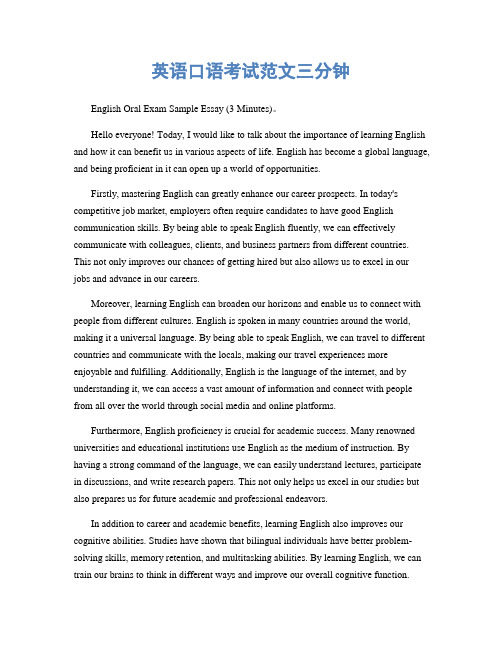
英语口语考试范文三分钟English Oral Exam Sample Essay (3 Minutes)。
Hello everyone! Today, I would like to talk about the importance of learning English and how it can benefit us in various aspects of life. English has become a global language, and being proficient in it can open up a world of opportunities.Firstly, mastering English can greatly enhance our career prospects. In today's competitive job market, employers often require candidates to have good English communication skills. By being able to speak English fluently, we can effectively communicate with colleagues, clients, and business partners from different countries. This not only improves our chances of getting hired but also allows us to excel in our jobs and advance in our careers.Moreover, learning English can broaden our horizons and enable us to connect with people from different cultures. English is spoken in many countries around the world, making it a universal language. By being able to speak English, we can travel to different countries and communicate with the locals, making our travel experiences more enjoyable and fulfilling. Additionally, English is the language of the internet, and by understanding it, we can access a vast amount of information and connect with people from all over the world through social media and online platforms.Furthermore, English proficiency is crucial for academic success. Many renowned universities and educational institutions use English as the medium of instruction. By having a strong command of the language, we can easily understand lectures, participate in discussions, and write research papers. This not only helps us excel in our studies but also prepares us for future academic and professional endeavors.In addition to career and academic benefits, learning English also improves our cognitive abilities. Studies have shown that bilingual individuals have better problem-solving skills, memory retention, and multitasking abilities. By learning English, we can train our brains to think in different ways and improve our overall cognitive function.Lastly, learning English can also provide us with a sense of personal fulfillment. Being able to communicate effectively in a foreign language gives us a sense of accomplishment and boosts our self-confidence. It allows us to express ourselves more articulately and engage in meaningful conversations with people from different backgrounds.In conclusion, learning English is essential in today's globalized world. It opens up a world of opportunities, enhances our career prospects, broadens our horizons, improves our cognitive abilities, and provides us with personal fulfillment. So, let's embrace the English language and strive to become proficient in it. Thank you for listening!。
英语作文 关于英语口语

英语作文关于英语口语Title: English Oral English。
English oral English is an essential skill for anyone who wants to communicate effectively in English. It is the ability to speak fluently and confidently in English, andit is crucial for success in both personal and professional settings. In this article, we will explore the importance of English oral English and discuss some tips for improving this skill.First and foremost, English oral English is important for effective communication. When you can speak English fluently and confidently, you can express your thoughts and ideas clearly and effectively. This is essential for building strong relationships, both personally and professionally. Whether you are giving a presentation at work, participating in a meeting, or simply having a conversation with a friend, strong oral English skills will help you communicate with ease and confidence.Furthermore, English oral English is important for career advancement. In today's globalized world, English is often the language of business. Many companies require employees to have strong English oral English skills in order to communicate with international clients and colleagues. Additionally, in many industries, strong oral English skills are necessary for leadership positions and career advancement. By improving your English oral English skills, you can open up new opportunities for career growth and success.So, how can you improve your English oral English skills? Here are some tips to help you become a more confident and fluent English speaker:1. Practice speaking English regularly. The more you speak English, the more comfortable and confident you will become. Try to find opportunities to speak English in your daily life, whether it's with friends, colleagues, or even by yourself.2. Listen to native English speakers. By listening to native English speakers, you can improve your pronunciation, intonation, and overall speaking skills. You can listen to English podcasts, watch English movies and TV shows, oreven engage in conversations with native English speakersif possible.3. Expand your vocabulary. The more words you know, the more effectively you can express yourself in English. Make an effort to learn new words and phrases, and practiceusing them in your conversations.4. Seek feedback. Ask for feedback from native English speakers or language teachers. They can provide valuable insights and suggestions for improvement.5. Be confident. Confidence is key when it comes to speaking English. Even if you make mistakes, don't beafraid to keep speaking and practicing. The more confident you are, the more fluent and natural your English will become.In conclusion, English oral English is a crucial skill for effective communication and career advancement. By practicing regularly, listening to native speakers, expanding your vocabulary, seeking feedback, and being confident, you can improve your English oral English skills and become a more fluent and confident English speaker. So, keep practicing and don't be afraid to speak up! Your efforts will surely pay off in the long run.。
英语日常口语练习
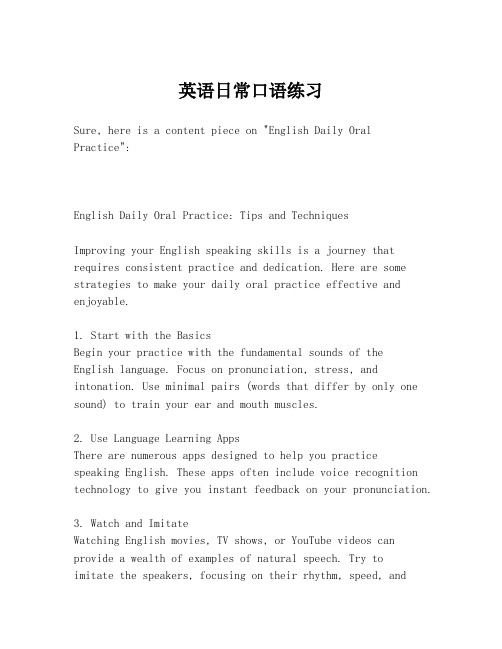
英语日常口语练习Sure, here is a content piece on "English Daily Oral Practice":English Daily Oral Practice: Tips and TechniquesImproving your English speaking skills is a journey that requires consistent practice and dedication. Here are some strategies to make your daily oral practice effective and enjoyable.1. Start with the BasicsBegin your practice with the fundamental sounds of theEnglish language. Focus on pronunciation, stress, and intonation. Use minimal pairs (words that differ by only one sound) to train your ear and mouth muscles.2. Use Language Learning AppsThere are numerous apps designed to help you practicespeaking English. These apps often include voice recognition technology to give you instant feedback on your pronunciation.3. Watch and ImitateWatching English movies, TV shows, or YouTube videos can provide a wealth of examples of natural speech. Try toimitate the speakers, focusing on their rhythm, speed, andexpressions.4. Record YourselfRecording your voice is a powerful tool for self-assessment. Listen to the recordings and compare your pronunciation and intonation with native speakers.5. Practice ConversationsPrepare common conversation topics and practice them out loud. Role-play different scenarios to build confidence in various social situations.6. Join Language Exchange GroupsParticipating in language exchange groups can provide youwith the opportunity to speak with native speakers and other learners. This not only improves your fluency but alsoexposes you to different accents and dialects.7. Use FlashcardsCreate flashcards with new vocabulary and phrases. Practice saying them out loud to reinforce your memory and pronunciation.8. Speak in English as Much as PossibleMake a conscious effort to speak English in your daily life. This could be with friends, at work, or even when you're alone.9. Set Realistic GoalsSetting achievable goals can keep you motivated. Whether it's learning a new phrase every day or having a conversationwithout hesitation, make sure your goals are specific and measurable.10. Stay ConsistentConsistency is key in language learning. Even if it's just a few minutes a day, make sure to practice regularly to see progress.Remember, the goal is not only to speak English correctly but also to feel comfortable doing so. With the right approach and regular practice, you'll find yourself becoming more fluent and confident in no time.。
英语口语每天练习
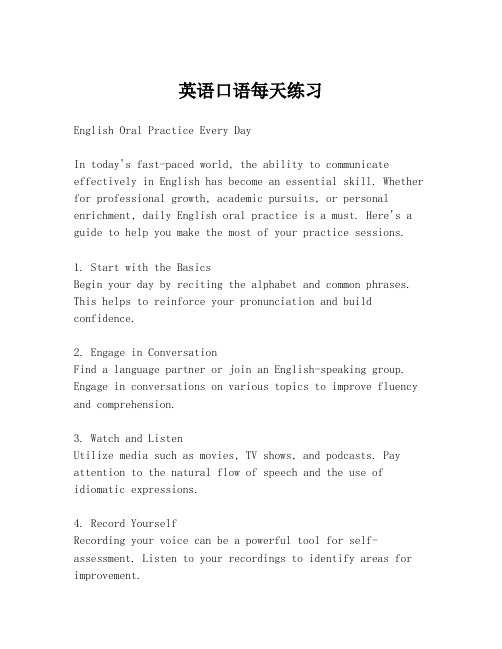
英语口语每天练习English Oral Practice Every DayIn today's fast-paced world, the ability to communicate effectively in English has become an essential skill. Whether for professional growth, academic pursuits, or personal enrichment, daily English oral practice is a must. Here's a guide to help you make the most of your practice sessions.1. Start with the BasicsBegin your day by reciting the alphabet and common phrases. This helps to reinforce your pronunciation and build confidence.2. Engage in ConversationFind a language partner or join an English-speaking group. Engage in conversations on various topics to improve fluency and comprehension.3. Watch and ListenUtilize media such as movies, TV shows, and podcasts. Pay attention to the natural flow of speech and the use of idiomatic expressions.4. Record YourselfRecording your voice can be a powerful tool for self-assessment. Listen to your recordings to identify areas for improvement.5. Use Language Learning AppsApps like Duolingo, Babbel, or Rosetta Stone offer structured lessons and interactive exercises to enhance your speaking skills.6. Practice PronunciationFocus on difficult sounds or words. Use the International Phonetic Alphabet (IPA) to understand the correct mouth and tongue positions.7. Read Out LoudReading aloud from books, newspapers, or online articles helps in improving pronunciation and intonation.8. Learn and Use New VocabularyExpand your vocabulary by learning new words daily. Use them in sentences to understand their context and meaning.9. Think in EnglishTrain your brain to think in English. This will help you to respond more quickly and naturally in conversations.10. Be ConsistentConsistency is key in language learning. Dedicate a specific time each day for your English oral practice.11. Embrace MistakesDo not be afraid to make mistakes. They are an integral part of the learning process.12. Reflect and AdjustRegularly reflect on your progress and adjust your practice methods as needed.13. Stay MotivatedSet achievable goals and celebrate your progress. Keep your motivation high by connecting with others who share your language learning journey.14. Immerse YourselfIf possible, immerse yourself in an English-speaking environment. This can drastically improve your listening and speaking skills.15. Enjoy the ProcessRemember that learning a language should be enjoyable. Find joy in the process and the small victories you achieve along the way.Daily English oral practice not only improves your language skills but also opens doors to new cultures, friendships, and opportunities. Stay committed, and you will see progress over time.。
英语口语回答
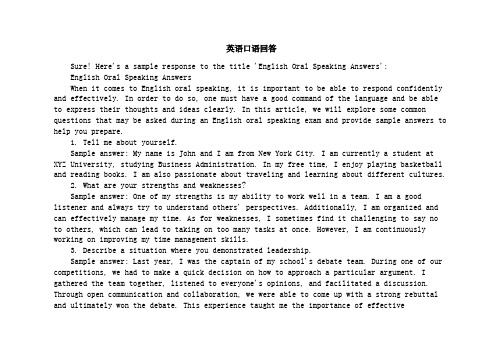
英语口语回答Sure! Here's a sample response to the title 'English Oral Speaking Answers':English Oral Speaking AnswersWhen it comes to English oral speaking, it is important to be able to respond confidently and effectively. In order to do so, one must have a good command of the language and be able to express their thoughts and ideas clearly. In this article, we will explore some common questions that may be asked during an English oral speaking exam and provide sample answers to help you prepare.1. Tell me about yourself.Sample answer: My name is John and I am from New York City. I am currently a student at XYZ University, studying Business Administration. In my free time, I enjoy playing basketball and reading books. I am also passionate about traveling and learning about different cultures.2. What are your strengths and weaknesses?Sample answer: One of my strengths is my ability to work well in a team. I am a good listener and always try to understand others' perspectives. Additionally, I am organized and can effectively manage my time. As for weaknesses, I sometimes find it challenging to say no to others, which can lead to taking on too many tasks at once. However, I am continuously working on improving my time management skills.3. Describe a situation where you demonstrated leadership.Sample answer: Last year, I was the captain of my school's debate team. During one of our competitions, we had to make a quick decision on how to approach a particular argument. I gathered the team together, listened to everyone's opinions, and facilitated a discussion. Through open communication and collaboration, we were able to come up with a strong rebuttal and ultimately won the debate. This experience taught me the importance of effectiveleadership and the value of teamwork.4. How do you handle stress and pressure?Sample answer: When I am faced with stress and pressure, I try to stay calm and focus on the task at hand. Taking deep breaths and organizing my thoughts help me clear my mind and approach the situation with a clear perspective. Additionally, I find that regular exercise and practicing mindfulness techniques, such as meditation, help me manage stress effectively.5. What are your long-term goals?Sample answer: In the long term, I aim to establish a successful career in the business field. I envision myself working in a dynamic and challenging environment where I can apply my skills and knowledge to contribute to the growth of the organization. Furthermore, I am keen on continuing my personal and professional development through ongoing learning and acquiring new skills.Remember, these sample answers are meant to serve as a guide. It is important to personalize your responses based on your own experiences and goals. Practice these answers with a friend or mentor to gain confidence in expressing yourself fluently and coherently in English. Good luck with your English oral speaking exam!。
- 1、下载文档前请自行甄别文档内容的完整性,平台不提供额外的编辑、内容补充、找答案等附加服务。
- 2、"仅部分预览"的文档,不可在线预览部分如存在完整性等问题,可反馈申请退款(可完整预览的文档不适用该条件!)。
- 3、如文档侵犯您的权益,请联系客服反馈,我们会尽快为您处理(人工客服工作时间:9:00-18:30)。
1.Don't flatter me. 过奖了。
2.Don't push me up. 别逼我。
3.You ask for it! 活该!
4.We have no way out. 我们没办法。
5.Dinner is on me. 晚饭我请。
6.I'm dying to see you. 我很想见你。
7.Chin up振作些。
8.My hands are full right now.我现在很忙。
9.Talk truly. 有话直说。
10.Don't turn your back on us.别抛弃我们。
11.Do you copy?收到了吗?Roger.收到了。
12.Nobody's punking out.没人退出。
13.Not in a thousand years.想都别想。
14.This far, no farther.这是底线,绝不退让。
15.Fairly straightforward.很通俗易懂。
16.It's over for good.永远结束了.
17.You're slipping.你错了.
18.Keep me posted. 和我保持联系.
19.Your call.你决定吧.
20.That's my ego.是我自以为是了.
21.Go nothing!别动!
22.It looks like we're back to square one.看来我们又回到起点了
23.We're headed out.我们出发了
24.You moron.你没得救了.
25.It's your fond hope.你是一厢情愿.
26.You're as bold as brass.你脸皮够厚.
27.Don't push your luck.你别太嚣张了
28.It's out of our hands now.现在就等着吧.
29.It's just an empty threat.只是虚张声势。
30.Give me an eyeball.给我来个特写.
31.Have a heart!行行好嘛
32.Stop pretending! 别装了!
33.Piss me off!气死我了!
34.That's an exaggeration!太夸张了
35.You are dreaming!你做梦!7
36.What for?为什么呢?
37.Behave!安分点!
38.Cheap skate!小气鬼!
39.Who wants?谁稀罕?
40.You're "chicken".你这个胆小鬼
41.He was caught in the rain like a "drowned rat".他被淋得像落汤鸡似
的.
42.How could I ever trust that "snake"?你要我怎么相信他呢?
43.I don't want that "monkey" on my back.我不想有负担.
44.Let's "pig" out.让我们大吃一顿吧.
45.He is going to "have a cow".他会大发雷霆的。
46.He was like "a cat in hot bricks".他紧张得像热锅上的蚂蚁。
47.He is a real "home bird".他真的很宅。
48.I smell a "rat".我觉得事有蹊跷。
49.A "leopard" doesn't change its spots.本性难移。
